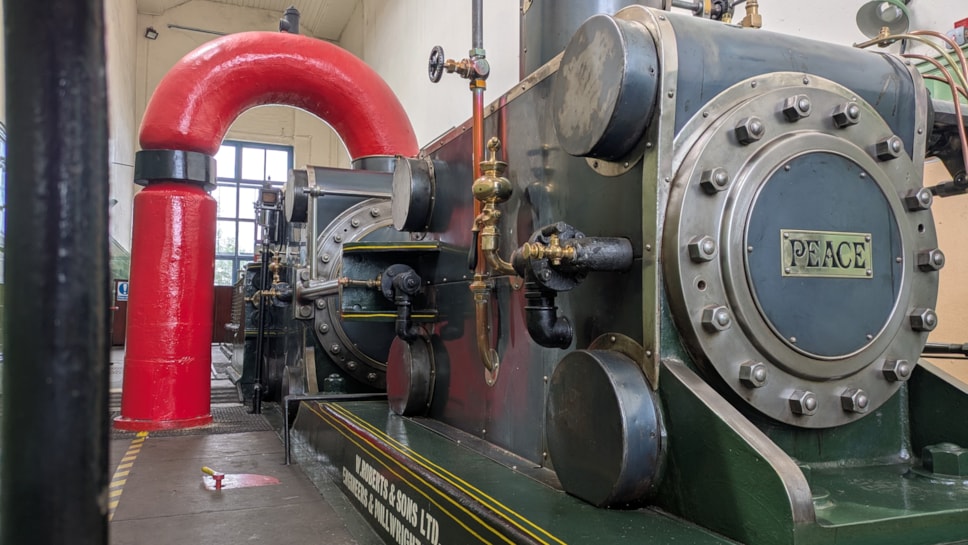
Witness Burnley's awe-inspiring 'Peace' engine at Queen Street Mill's Steam Days
A rare opportunity to see the world's last steam-powered weaving shed come to life is happening this week in Burnley.
Built in 1894, Queen Street Mill played a crucial role in Lancashire's cotton industry, which was a major driver of Britain's industrialisation. When it was at its peak around a century ago, the mill would have been a bustling hive of industry, filled with the pulsing clatter of hundreds of looms.
At the heart of it all, stood Peace, the mill's formidable steam engine.
On Friday 27 June and Saturday 28 June, visitors to Queen Street Mill will be able to see – and hear – this impressive sight for themselves as part of its highly anticipated Steam Days.
During these special Steam Days, Peace will spring to life, driving the 16-ton flywheel that connects to the line shafts once responsible for operating more than 900 looms. Visitors will experience the thunderous roar and rhythmic motion of the machinery, transporting them back in time to the golden era of cotton production.
"The engine can power up to 1000 looms in that one floor surface," said Peter Robinson, an engine technician for Lancashire County Council who has helped prepare Peace for her comeback.
"You can imagine the noise when all of them were running, with all the leather belts flapping around. It would be very impressive.
"We still have over 300 looms now. The public will see it when they come and the engine is actually in steam."
This rare event marks the first time since 2022 that visitors will witness the awe-inspiring sight of Peace powering the historic weaving shed.
Originally called ‘Prudence’, the steam engine was renamed Peace after a devastating fire in 1918, as a mark of respect for the fallen soldiers of the First World War. At that time, the Lancashire textile industry was supplying fabric to markets around the world, with Queen Street Mill producing woven cotton on a vast scale.
The workforce, predominantly women and young girls, would have laboured tirelessly amid the deafening roar of machinery. The work was demanding, requiring skill, speed, and endurance, while communication relied on hand signals and lip-reading, as the relentless noise drowned out voices.
A shot from the archives taken in 1979
Peter said: "The weavers would have started at seven o'clock in the morning, work until about nine o'clock and then have about half an hour for their breakfast.
"We think they would have had about 5 looms each. They would have worked until twelve o'clock, had an hour for lunchtime, and they would be back to work in the afternoon until six o'clock at night.
"And the noise would be absolutely unbelievable."
County Councillor Matthew Salter, cabinet member for Education and Skills, said:
"This is a rare opportunity to see Peace back in action, powering the last steam-powered weaving shed in the world as she would have done more than a century ago.
"This will be a remarkable sight that hasn’t happened since 2022, so I would encourage people to visit Queen Street Mill for a real glimpse into Lancashire's industrial past."
Demonstrations will take place for 20 minutes, every hour between 1pm – 3pm on 27 and 28 June.
For more information visit: https://www6.apps.lancashire.gov.uk/w/webpage/event-details?eventid=2164727
Notes to editors
Notes to editors
The engine will only be running on designated Steam Days and is not scheduled to run on other days for this season.
Please be aware that the mill can get very loud when our engine and looms are running, ear protection may be required if you have any sensitivity to loud and continuous noise.
Standard Museum Admission Applies, £5 Adults, Under 18's are Free.
Additional information on Queen Street Mill and Peace
Queen Street Mill is an Accredited Museum owned by Lancashire County Council and operated as part of Lancashire County Museum Service. The textile industry machinery and engineering inside the mill are also Designated of National Significance by Arts Council England. It is a time capsule from the Industrial Age and a unique visitor attraction. It is the last steam powered weaving shed and the only place where you can see and experience a complete Victorian cotton factory and see demonstrations of weaving on Lancashire looms that once employed millions of people and dominated the British economy.
When it opened in 1895 the original shed had over 900 looms and although now much smaller it still houses just over 300 looms made by Pemberton & Co and Harling & Todd Limited in Burnley. When powered the noise is incredible and it immediately takes you back in time, to how people worked in Lancashire over 100 years ago. As a working historic mill it has been used in documentaries, TV dramas and feature films, such as The Kings Speech in 2010. The mill sells the cloth produced during demonstrations, and items made from the calico in the gift shop. It uses cotton yarn made on mule spinning machines at Whittaker Mill, part of Helmshore Mills Textile Museum, also operated by Lancashire County Council.
The Steam Plant
Another unique aspect of Queen Street Mill is the original steam plant. This consists of two Lancashire boilers and a steam engine. When in steam the plant powers the line shafts which power looms in the shed.
The two Lancashire boilers are coal fired boilers made by Tinker, Shenton and Company in Hyde, Cheshire. The first was installed in 1895 and the second in 1901. Water is fed into the boiler via a pump taking water from a nearby mill pond. Currently only the 1901 boiler is used and is manually stoked. The older boiler has automatic stokers fitted. Both ran through a Green's economiser which was taken out of service in 2015.
The steam engine, now named Peace, is an original tandem compound horizontal stationary steam engine and provides 500 horsepower (370kw). It was made by William Roberts and Company of Nelson. It was upgraded in 1913 with new Corliss rotary valves.
Find out more here: https://www.youtube.com/watch?v=fWARvgoQwRw –

